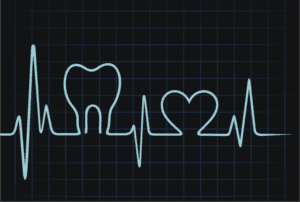 The heart is more than the organ we associate with love. The American Heart Association (AHA) strives to raise awareness about heart disease and how to preserve heart health.
The heart is more than the organ we associate with love. The American Heart Association (AHA) strives to raise awareness about heart disease and how to preserve heart health.
Heart disease is the leading cause of death in the United States. It’s important to learn about what impacts heart health, such as how oral health can affect your heart.
How are Oral Health and Heart Disease Related?
It is well-known that unchecked inflammation in the body is undesirable and leads to disease. This is true for the heart as well. Inflammation and endocarditis, an infection of the heart lining, occurs when bacteria travels from the mouth through the bloodstream and into the heart, according to studies conducted by the National Institute of Dental and Craniofacial Research (NIH).
Who is at Risk?
People with inadequate or poor oral hygiene are at highest risk. Without proper care of teeth and gums, plaque builds up. Eventually, this buildup leads to gum disease and the growth of bacteria, which enters the bloodstream and can affect the heart.
Other Potential Health Concerns
Healthy oral hygiene habits are critical to avoid heart disease and other health issues. According to research, there is a potential link between oral health and stroke, as well as atherosclerosis (clogged arteries). Bacteria can pass into the bloodstream and flow throughout the body, affecting other vital organs and bodily systems. Poor oral health has even been linked to some cases of dementia, premature birth, diabetes, and rheumatoid arthritis.
How to Prevent Problems
Regular brushing and flossing, as well as routine dental examinations and cleanings, are imperative to prevent heart disease caused by chronic gum conditions. Oral professionals also suggest using an antimicrobial mouthwash daily to further reduce bacteria. Ask your dentist for tips on improving or enhancing your current tooth and gum care regimen.
Between dental visits, watch for the early stages of gum disease such as swelling, bleeding, soreness, loose teeth, bad breath, and signs of infection, such as sores. Seek treatment as early as possible if you suspect gum disease.
While there are procedures and treatments for replacing lost teeth, getting a heart transplant is infinitely more complicated. The waiting list for a new heart is nearly twice that of the number of transplants performed to date. So be proactive with your oral health to reduce your chances of heart disease.
The information and content on our website should not be used as a substitute for medical treatment or advice from your doctor.












